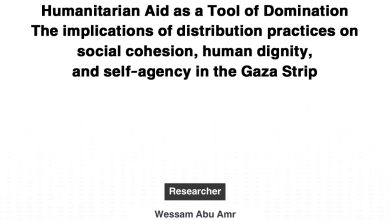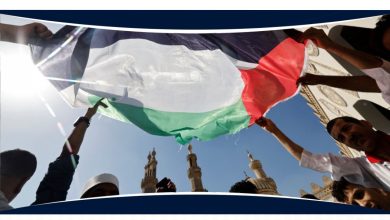What Do Peace Envoys Actually Do in the Middle East?

By: Omar Shaban
![]() The small triangle — with its three points of Tel Aviv, Ramallah and Jerusalem — has been thronged with peace envoys from around the world. They all seek to achieve peace between Israel and the Palestinians. Evidently, these efforts were all to no avail, despite the many envoys that were sent to the region, including envoys of the European Union, the UN’s secretary general, the US administration, the Quartet, in addition to Chinese and Russian envoys.
The small triangle — with its three points of Tel Aviv, Ramallah and Jerusalem — has been thronged with peace envoys from around the world. They all seek to achieve peace between Israel and the Palestinians. Evidently, these efforts were all to no avail, despite the many envoys that were sent to the region, including envoys of the European Union, the UN’s secretary general, the US administration, the Quartet, in addition to Chinese and Russian envoys.
This is not to mention the hundreds of international agencies, which are supposed to be concerned with security, development, refugees, environment, population and prisoners. While some of the international institutions working in the field of development and relief have played a significant role — that cannot be overlooked — in favor of the Palestinian cause and have been much appreciated by Palestinians, some peace envoys have failed to do the same in a region that has lacked peace for decades. This is a region that is scarred by war and has been suffering from political and military struggles for decades, despite the many peace envoys thronging its territories.
With every passing moment, the chances of peace lessen in the region. These envoys cannot deny this truth, for they have been witnessing the slow death of the two-state solution, which has become closer to an illusion than reality. With their armored vehicles, which are worth thousands of dollars, they go past the checkpoints without waiting. In their cold reports they write about the heated settlement operations, while whispering about the ongoing blockade imposed on 1.5 million Palestinians since 2007. They may differ in names, appearance and in the level of their mission’s expenditure, but they are all the same in terms of mediocre performance compared with their pompous titles and costs of their missions.
First: the Quartet’s envoy for the peace process
The Quartet’s envoy is Tony Blair, former British prime minister and the main ally of former US President George W. Bush. Palestinians were optimistic about the appointment of Blair, believing that he would be able to achieve peace in Palestine, as he contributed to the peace process in Northern Ireland. Palestinians were also optimistic about Blair’s appointment because he was close to Israel’s policy and a strategic ally of the US administration, which made them believe that he would influence both parties to the advantage of a just peace in the region.
At the beginning of his work, Blair used to have frequent appearances in the media, but without achieving much. His role was mainly to facilitate the entry of raw materials for some infrastructure projects. He also contributed to the organization of the two investment conferences in Bethlehem. Parenthetically, there is no difference between the international Quartet, which includes three great powers and the international nongovernmental organization working in the construction of roads and infrastructure projects.
Over the past two years, Blair has stopped appearing in the media and dedicated himself to provide consultancy services to major companies that have paid him millions of dollars, according to some media outlets. This has prompted many to ask: Where did Blair go? Is he still the Quartet’s envoy or has he abandoned his job in despair as he has failed to achieve tangible results? Is he still working but keeping a low profile?
Even the Palestinian Authority, which at first welcomed his appointment, described him later on as useless and unwanted in Palestine as well as in civil society organizations. History will remember that the international Quartet’s conditions were a sword hanging over the neck of Palestinian reconciliation and national unity, which have replaced all international and UN resolutions regarding the Palestinian cause. The international Quartet — which includes the US, Russia, the EU and the UN — is inconsistent with the nature of things: How could the UN be equal to the member states that are already members in its organization?
Second: The EU’s envoy for peace
The EU envoy is Andreas Reinicke, who was the envoy of Catherine Ashton, the EU High Representative for Foreign Affairs and Security Policy. He was appointed in February 2012, when the EU closed the office of its peace envoy in the Middle East for one year. Reinicke was not very well known in Palestinian society due to the lack of his movements and his preference for acting silently. Reinicke’s position was in line with that of the EU regarding the Palestinian cause. Indeed, when it comes to the amount of funding for the Palestinian people, the EU is at the forefront, but when it comes to political actions and influence, it stays in the background. The most surprising thing, however, is that when the EU reopened its peace envoy’s office in Tel Aviv, the event was not even mentioned in the news.
Third: The envoy of the UN secretary-general for the peace process
The UN secretary-general’s Enoy is Robert Serry. He represents UN Secretary General Ban Ki-moon. Since he was appointed, Ban Ki-moon has honored the Gaza Strip with two visits, which did not last more than three hours each.
Perhaps the silence of Serry about the death of the peace process can be attributed to the fact that his boss is even more “silent” about the situation. Indeed, Ban is idle. There is no difference between his presence and his absence. What is even worse is that whenever you listen to his statements you risk an increased blood pressure due to his dull monotone. In fact, you cannot tell the difference in his tone when he speaks about the aggressive Israeli war on Gaza or the massacres in Libya, Africa and Syria, and when he speaks about the environment and the ozone layer. Nevertheless, history will remember that Ban has actually succeeded in transforming the UN from a protector of world peace to a contracting company.
In fact, the UN did not intervene to prevent the destruction in Libya. It has rather swiftly sent its extravagantly-paid advisers to help in the country’s reconstruction. What’s more, the UN has not lifted a finger to stop the massacres and destruction in Syria and there is no doubt that it will soon send its contractors there to ensure jobs for its employees and grant them legitimacy over the Syrian enclaves that will be established in no time at a later stage.
Fourth: The US envoy for the peace process
Ever since President Barack Obama was elected, two US envoys have been appointed for the peace process in the Middle East. First, there was Sen. George Mitchell, who was appointed in mid-January 2009, only to resign after five months because he failed to make any progress in the peace process due to the lack of harmony inside the White House regarding the role of the US in the region. Afterward, Mitchell’s deputy, David Hill, was appointed as the new envoy for the peace process. There was nothing new about this appointment. It was merely another change in names and the situation will remain the same as long the US administration has no sufficient intention to make a real change in the peace process.
Some of these peace envoys come to the Gaza Strip with their employees at spaced intervals. They wander around in certain areas, stay in its luxurious hotels, eat Gaza’s finest food and meet with its elite residents. Their visits are only formalities that last for a few hours.
Is it not strange that all peace envoys are looking for one thing, which is peace, without even bothering to come all together to coordinate their efforts? Although many have been searching for it, peace remains lost in the desert of the unjust international politics waiting for someone who would faithfully and truly look for it.
[highlight]http://www.al-monitor.com/pulse/originals/2013/04/peace-envoys-middle-east-palestine-israel.html[/highlight]




